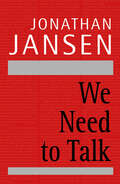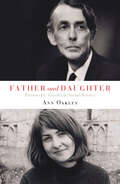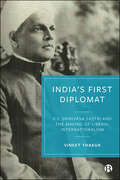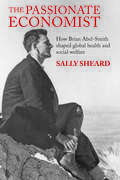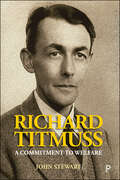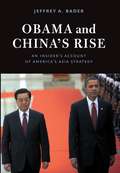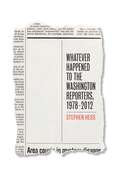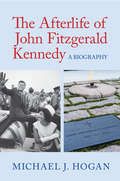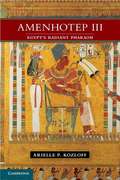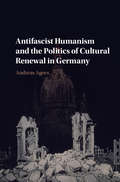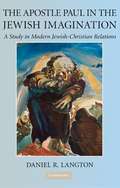- Table View
- List View
Father and Daughter: Patriarchy, Gender and Social Science
by Ann OakleyFather and daughter provides an unique ‘insider perspective’ on two key figures in twentieth-century British social science. Ann Oakley, a highly respected sociologist and best-selling writer, draws on her own life and that of her father, Richard Titmuss, a well-known policy analyst and defender of the welfare state, to offer an absorbing view of the connections between private lives and public work. Using an innovative mix of biography, autobiography, intellectual history, archives, and personal interviews, some of which have not been previously available to the public, she provides a compelling narrative about gender, patriarchy, methodology, and the politics of memory and identity. This fascinating analysis defies the usual social science publications to offer a truly distinctive account which will be of wide interest.
India’s First Diplomat: V.S. Srinivasa Sastri and the Making of Liberal Internationalism
by Vineet ThakurV.S. Srinivasa Sastri was a celebrated Indian politician and diplomat in the early twentieth century. Despite being hailed as the ‘very voice of international conscience’, he is now a largely forgotten figure. This book rehabilitates Sastri and offers a diplomatic biography of his years as India’s roving ambassador in the 1920s. It examines his involvement in key conferences and agreements, as well as his achievements in advocating for racial equality and securing the rights of Indians both at home and abroad. It also illuminates the darker side of being a native diplomat, including the risk of legitimizing the colonial project and the contradictions of being treated as an equal on the world stage while lacking equality at home. In retrieving the legacy of Sastri, the book shows that liberal internationalism is not the preserve of western powers and actors – where it too often represents imperialism by other means – but a commitment to social progress fought at multiple sites and by many protagonists.
The Passionate Economist: How Brian Abel-Smith Shaped Global Health and Social Welfare (LSE Pioneers in Social Policy)
by Sally SheardBrian Abel-Smith was one of the most influential expert advisers of the 20th century in shaping social welfare. He was a modern-day Thomas Paine, driven by a strong socialist mission to improve the lives of the poorest. This valuable and accessible book is the first biography of Abel-Smith. It takes a historical perspective to analyse the development of health and social welfare systems since the 1950s, exposing the critical impact of long-running debates on poverty and state responsibility, especially in Britain. This book also provides the first comparative study of how developing countries sought better health and social welfare, enabled by the World Health Organization and other agencies for whom Abel-Smith regularly worked. This book offers an engaging and useful study for students and researchers in health and social policy, history, politics and economics and interested general readers. It will also be essential reading for professionals working in those government ministries and institutions that Brian Abel-Smith helped to shape. LSE Pioneers in Social Policy Brian Abel-Smith, Richard Titmuss and Peter Townsend, all based at the London School of Economics and Political Science, made major contributions to the development of policies on the elderly, health care, law, poverty and welfare in the 20th century. This series of biographies tells the stories of these outstanding individuals: their backgrounds, ideas and work.
Richard Titmuss: A Commitment to Welfare (LSE Pioneers in Social Policy)
by John StewartThis is the first full-length biography of Richard Titmuss, a pioneer of social policy research and an influential figure in Britain’s post-war welfare debates. Drawing on his own papers, publications, and interviews with those who knew him, the book discusses Titmuss’s ideas, particularly those around the principles of altruism and social solidarity, as well as his role in policy and academic networks at home and overseas. It is an enlightening portrait of a man who deepened our understanding of social problems as well as the policies that respond most effectively to them.
Obama and China's Rise
by Jeffrey A. Bader"Future presidents will need to find the right balance in China policy, so as to maintain America's strength and watchfulness but not fall into the classic security dilemma, wherein each side believes that growing capabilities reflect hostile intent and responds by producing that reality. I believe that President Obama struck that balance." --From Obama and China's RiseIn 2005, veteran diplomat and Asia analyst Jeffrey Bader met for the first time with the then-junior U.S. senator from Illinois. When Barack Obama entered the White House a few years later, Bader was named the senior director for East Asian affairs on the National Security Council, becoming one of a handful of advisers responsible for formulating and implementing the administration's policy regarding that key region. For obvious reasons--a booming economy, expanding military power, and increasing influence over the region--the looming impact of a rising China dominated their efforts.Obama's original intent was to extend U.S. influence and presence in East Asia, which he felt had been neglected by a Bush administration fixated on the Middle East, particularly Iraq, and the war on terror. China's rise, particularly its military buildup, was heightening anxiety among its neighbors, including key U.S. allies Japan and South Korea. Bader explains the administration's efforts to develop stable relations with China while improving relationships with key partners worried about Beijing's new assertiveness.In Obama and China's Rise, Bader reveals what he did, discusses what he saw, and interprets what it meant--first during the Obama campaign, and then for the administration. The result is an illuminating backstage view of the formulation and execution of American foreign policy as well as a candid assessment of both. Bader combines insightful and authoritative foreign policy analysis with a revealing and humanizing narrative of his own personal journey.
Whatever Happened to the Washington Reporters, 1978-2012
by Stephen HessWhatever Happened to the Washington Reporters, 1978-2012, is the first book to comprehensively examine career patterns in American journalism. In 1978 Brookings Senior Fellow Stephen Hess surveyed 450 journalists who were covering national government for U.S. commercial news organizations. His study became the award-winning The Washington Reporters (Brookings, 1981), the first volume in his Newswork series. Now, a generation later, Hess and his team from Brookings and the George Washington University have tracked down 90 percent of the original group, interviewing 283, some as far afield as France, England, Italy, and Australia.What happened to the reporters within their organizations? Did they change jobs? Move from reporter to editor or producer? Jump from one type of medium to another--from print to TV? Did they remain in Washington or go somewhere else? Which ones left journalism? Why? Where did they go?A few of them have become quite famous, including television correspondents Ted Koppel, Sam Donaldson, Brit Hume, Carole Simpson, Judy Woodruff, and Marvin Kalb; some have become editors or publishers of the New York Times, Wall Street Journal, Chicago Tribune, Miami Herald, or Baltimore Sun; some have had substantial careers outside of journalism. Most, however, did not become household names.The book is designed as a series of self-contained essays, each concentrating on one characteristic, such as age, gender, or place of employment, including newspapers, television networks, wire services, and niche publications. The reporters speak for themselves. When all of these lively portraits are analyzed--one by one--the results are surprisingly different from what journalists and sociologists in 1978 had predicted.
Aaron Klug A Long Way from Durban
by Holmes Kenneth C.The atomic structures of macromolecules provide the key to understanding how life works. Aaron Klug led the way in the development of methods for solving such structures and is one of the pioneers of structural molecular biology. He was awarded a Nobel Prize in 1982 for his work. Illuminating both his personal life and scientific achievements, this unique biography begins with Klug's youth in Durban and his studies at Johannesburg, Cape Town and then Trinity College, Cambridge. Holmes proceeds to explore Klug's career from his work on the structure of viruses with Rosalind Franklin at Birkbeck College, London to his time as Director of the MRC Laboratory of Molecular Biology (LMB) in Cambridge and as President of the Royal Society. Drawing on their long-term collaboration, interviews and unique access to Klug's archives, Holmes provides a fascinating account of an innovative man and his place in the history of structural molecular biology.
Abraham Lincoln
by Terence BallAbraham Lincoln occupies a unique place in the American pantheon. Symbol, sage, myth and martyr, he is an American icon - Honest Abe and The Great Emancipator, a Janus-faced demigod sculpted in marble. But this is the post-assassination Lincoln. During his lifetime Lincoln elicited very different reactions. The writings and speeches presented in this scholarly edition illuminate Lincoln as a political thinker in the context of his own time and political situation. Opening with a concise yet rich introduction, the texts that follow are complete and carefully edited, with extensive annotation and footnotes to provide a clearer insight into Lincoln the man, the politician and political thinker. His views on race and slavery, on secession and civil war and on the contradiction (as his saw it) between the Declaration of Independence ('all men are created equal') and the original Constitution (which condones slavery) are laid out in Lincoln's own well-crafted words.
Accounting for Ministers
by Samuel BerlinskiAccounting for Ministers uses the tools of modern political science to analyse the factors which determine the fortunes of Cabinet ministers. Utilising agency theory, it describes Cabinet government as a system of incentives for prime ministerial and parliamentary rule. The authors use a unique dataset of ministers from 1945 to 2007 to examine the structural and individual characteristics that lead to the selection and durability of ministers. Sensitive to historical context, it describes the unique features of different Prime Ministers and the sorts of issues and scandals that lead to the forced exit of ministers. The authors identify the structural factors that determine ministerial performance and tenure, seeing resignation calls as performance indicators. Probing the nature of individual and collective responsibility within Westminster forms of government, its rigorous analysis provides powerful new insights into the nature of Cabinet government.
After Mahler
by Stephen DownesThe music of Gustav Mahler repeatedly engages with Romantic notions of redemption. This is expressed in a range of gestures and procedures, shifting between affirmative fulfilment and pessimistic negation. In this groundbreaking study, Stephen Downes explores the relationship of this aspect of Mahler's music to the output of Benjamin Britten, Kurt Weill and Hans Werner Henze. Their initial admiration was notably dissonant with the prevailing Zeitgeist – Britten in 1930s England, Weill in 1920s Germany and Henze in 1950s Germany and Italy. Downes argues that Mahler's music struck a profound chord with them because of the powerful manner in which it raises and intensifies dystopian and utopian complexes and probes the question of fulfilment or redemption, an ambition manifest in ambiguous tonal, temporal and formal processes. Comparisons of the ways in which this topic is evoked facilitate new interpretative insights into the music of these four major composers.
The Afterlife of John Fitzgerald Kennedy
by Hogan Michael J.In his new book, Michael J. Hogan, a leading historian of the American presidency, offers a new perspective on John Fitzgerald Kennedy, as seen not from his life and times but from his afterlife in American memory. The Afterlife of John Fitzgerald Kennedy considers how Kennedy constructed a popular image of himself, in effect, a brand, as he played the part of president on the White House stage. The cultural trauma brought on by his assassination further burnished that image and began the process of transporting Kennedy from history to memory. Hogan shows how Jacqueline Kennedy, as the chief guardian of her husband's memory, devoted herself to embedding the image of the slain president in the collective memory of the nation, evident in the many physical and literary monuments dedicated to his memory. Regardless of critics, most Americans continue to see Kennedy as his wife wanted him remembered: the charming war hero, the loving husband and father, and the peacemaker and progressive leader who inspired confidence and hope in the American people.
Alan M. Turing
by Sara TuringTuring's reputation has grown, as his contributions to logic, mathematics, computing, and artificial intelligence have become better appreciated. This republication of his mother's biography is enriched by a never-before-published memoir by Alan's older brother.
The Alexiad of Anna Komnene
by Penelope BuckleyThis is the first full-scale study of the literary art of Anna Komnene's Alexiad. Her history of her father's reign is well-known and much used by Byzantinists and historians of the First Crusade, but the art with which it shapes its central character has not been fully examined or understood. This book argues that the work is both history and tragedy; the characterization of Alexios I Komnenos is cumulative; it develops; the models for his idealization change; much of the action takes place in his mind and the narrative relays and amplifies his thought while building a dense picture of the world in which he acts. Engaging critically and responsively with other texts, Komnene uses the full range of current literary genres to portray the ideal culture of his rule. She matches her art of literary control to his of government over the adverse forces of his time.
Amenhotep III: Egypt's Radiant Pharaoh
by Arielle P. KozloffThis book follows the life story of Amenhotep III, one of the most important rulers of ancient Egypt, from his birth and into the afterlife. Amenhotep III ruled for thirty-eight years, from ca.1391-1353 BC, during the apex of Egypt's international and artistic power. Arielle P. Kozloff situates Amenhotep in his time, chronicling not only his life but also the key political and military events that occurred during his lifetime and reign, as well as the evolution of religious rituals and the cult of the pharaoh. She further examines the art and culture of the court, including its palaces, villas, furnishings and fashions. Through the exploration of abundant evidence from the period, in the form of both textual and material culture, Kozloff richly re-creates all aspects of Egyptian civilization at the height of the Mediterranean Bronze Age.
American Machiavelli
by John Lamberton HarperAlexander Hamilton (1757-1804) was an illegitimate West Indian emigrant who became the first U. S. Secretary of the Treasury. American Machiavelli focuses on Hamilton's controversial activities as foreign policy adviser and aspiring military leader. In the first major study of his foreign policy role in 30 years, John Lamberton Harper describes a decade of bitter division over the role of the Federal government in the economy during the 1790s and draws parallels between Hamilton and the sixteenth century Italian political adviser, Niccolò Machiavelli. Harper provides an original and highly readable account of Hamiltonas famous clashes with Thomas Jefferson and John Adams, and his key role in defining the U. S. national security strategy. John Lamberton Harper is Professor of Foreign Policy and European Studies at the Johns Hopkins University Bologna Center. He is the author of America and the Reconstruction of Italy, 1945-1948 (Cambridge 1986), winner of the 1987 Marraro Prize from the Society for Italian Historical Studies, and American Visions of Europe: Franklin D. Roosevelt, George F. Kennan, and Dean G. Asheson (Cambridge 1994), winner of the 1995 Robert Ferrell Prize from the Society of Historians of American Foreign Relations. His articles and reviews have appeared in numerous publications, including The American Historical Review, The Journal of American History, The Times Literary Supplement and Foreign Affairs.
American Spies
by Granick Jennifer StisaUS intelligence agencies - the eponymous American spies - are exceedingly aggressive, pushing and sometimes bursting through the technological, legal and political boundaries of lawful surveillance. Written for a general audience by a surveillance law expert, this book educates readers about how the reality of modern surveillance differs from popular understanding. Weaving the history of American surveillance - from J. Edgar Hoover through the tragedy of September 11th to the fusion centers and mosque infiltrators of today - the book shows that mass surveillance and democracy are fundamentally incompatible. Granick shows how surveillance law has fallen behind while surveillance technology has given American spies vast new powers. She skillfully guides the reader through proposals for reining in massive surveillance with the ultimate goal of surveillance reform.
The Annals of Tacitus
by S. J. V. MallochBook 11, the first of the later books of the Annals to survive, narrates two years in the reign of Claudius, AD 47–8. While Claudius is busy with the duties of his censorship, his wife Messalina is having a very public love affair with the young aristocrat Silius that eventually ruins her. In a book that also treats German, eastern, and other Roman internal affairs, a third of the surviving narrative is devoted to the destruction of Messalina. Here we encounter the classic portrayal of a Claudius ignorant and manipulated by those around him in an extended narrative that shows Tacitus at his dramatic and cynical best. This edition of Book 11, the first scholarly one in English in over a hundred years, contains a full introduction, a newly-edited Latin text with apparatus, and a comprehensive commentary that illuminates historical, historiographical, textual, linguistic, and literary issues that arise from the narrative.
Antifascist Humanism and the Politics of Cultural Renewal in Germany
by Andreas AgocsAntifascism is usually described as either a political ideology of activists and intellectuals confronting the dictatorships of Hitler and Mussolini, or as a cynical tool that justified the Stalinist expansion of communism in Europe. Andreas Agocs widens our understanding of antifascism by placing it in the context of twentieth-century movements of 'cultural renewal'. He explores the concept of 'antifascist humanism', the attempt by communist and liberal intellectuals and artists to heal the divisions of Nazism by reviving the 'other Germany' of classical Weimar. This project took intellectual shape in German exile communities in Europe and Latin America during World War II and found its institutional embodiment in the Cultural League for Democratic Renewal in Soviet-occupied Berlin in 1945. During the emerging Cold War, antifascist humanism's uneasy blend of twentieth-century mass politics and cultural nationalism became the focal point of new divisions in occupied Germany and the early German Democratic Republic. This study traces German traditions of cultural renewal from their beginnings in antifascist activism to their failure in the emerging Cold War.
Anxiety, Stress, and PTSD
by Stephen M. Stahl Meghan M. GradyThe Stahl's Illustrated books are a series of pocket-sized, mid-priced, themed volumes. They distil theoretical information from the Stahl's Essential Psychopharmacology volume and combine this with practical data from The Prescriber's Guide. They are illustration heavy and designed to encourage speedy learning of both concepts and applications. The visual learner will find that these books make the concepts easier to master, and the non-visual learner will appreciate the clear, shortened text on complex psychopharmacological concepts. This volume covers the latest developments in our understanding of post-traumatic stress disorder and anxiety. As well as covering the full range of management options, there is a specific focus on the implications for military populations. The Stahl's Illustrated series appeals to the widest possible audience of mental health professionals, and not just those with expertise in psychopharmacology.
The Apostle Paul in the Jewish Imagination: A Study in Modern Jewish-Christian Relations
by Daniel R. LangtonThe Apostle Paul in the Jewish Imagination is a pioneering multidisciplinary examination of Jewish perspectives on Paul of Tarsus. Here, the views of individual Jewish theologians, religious leaders, and biblical scholars of the last 150 years, together with artistic, literary, philosophical, and psychoanalytical approaches, are set alongside popular cultural attitudes. Few Jews, historically speaking, have engaged with the first-century Apostle to the Gentiles. The modern period has witnessed a burgeoning interest in this topic, however, with treatments reflecting profound concerns about the nature of Jewish authenticity and the developing intercourse between Jews and Christians. In exploring these issues, Jewish commentators have presented Paul in a number of apparently contradictory ways. The Apostle Paul in the Jewish Imagination represents an important contribution to Jewish cultural studies and to the study of Jewish-Christian relations.
Aristotle on Political Community
by David J. RiesbeckAristotle's claims that 'man is a political animal' and that political community 'exists for the sake of living well' have frequently been celebrated by thinkers of divergent political persuasions. The details of his political philosophy, however, have often been regarded as outmoded, contradictory, or pernicious. This book takes on the major problems that arise in attempting to understand how the central pieces of Aristotle's political thought fit together: can a conception of politics that seems fundamentally inclusive and egalitarian be reconciled with a vision of justice that seems uncompromisingly hierarchical and authoritarian? Riesbeck argues that Aristotle's ideas about the distinctive nature and value of political community, political authority, and political participation are coherent and consistent with his aristocratic standards of justice. The result is a theory that, while not free of problems, remains a potentially fruitful resource for contemporary thinking about the persistent problems of political life.
The Art of Being a Scientist
by Roel Snieder Ken LarnerThis is a hands-on guide for graduate students and young researchers wishing to perfect the practical skills needed for a successful research career. By teaching junior scientists to develop effective research habits, the book helps to make the experience of graduate study a more efficient and rewarding one. This book is an outgrowth of the notes for the graduate course, "The Art of Science," taught by the authors at Colorado School of Mines and highly rated and appreciated by students over the years. A sample curriculum, which parallels the curriculum followed in the authors' course, is available in the book as Appendix B, and as an online resource. This sample is offered as a possible starting point for instructors in graduate schools wanting to teach a similar course at their university. Topics covered in the book include: choosing a research topic, department, and advisor; making workplans; the ethics of research; using scientific literature; perfecting oral and written communication; publishing papers; writing proposals; managing time effectively; and planning a scientific career and applying for jobs in research and industry. The wealth of advice is invaluable to students, junior researchers and mentors in all fields of science, engineering, and the humanities.
The Art of Biography in Antiquity
by Tomas HäggGreek and Roman biography embraces much more than Plutarch, Suetonius and their lost Hellenistic antecedents. In this book Professor Hägg explores the whole range and diversity of ancient biography, from its Socratic beginnings to the Christian acquisition of the form in late antiquity. He shows how creative writers developed the lives of popular heroes like Homer, Aesop and Alexander and how the Christian gospels grew from bare sayings to full lives. In imperial Rome biography flourished in the works of Greek writers: Lucian's satire, Philostratus' full sophistic orchestration, Porphyry's intellectual portrait of Plotinus. Perhaps surprisingly, it is not political biography or the lives of poets that provide the main artery of ancient biography, but various kinds of philosophical, spiritual and ethical lives. Applying a consistent biographical reading to a representative set of surviving texts, this book opens up the manifold but often neglected art of biography in classical antiquity.
The Art of Medicine in Early China
by Miranda BrownIn this book, Miranda Brown investigates the myths that acupuncturists and herbalists have told about the birth of the healing arts. Moving from the Han (206 BC–AD 220) and Song (960–1279) dynasties to the twentieth century, Brown traces the rich history of Chinese medical historiography and the gradual emergence of the archive of medical tradition. She exposes the historical circumstances that shaped the current image of medical progenitors: the ancient bibliographers, medieval editors, and modern reformers and defenders of Chinese medicine who contributed to the contemporary shape of the archive. Brown demonstrates how ancient and medieval ways of knowing live on in popular narratives of medical history, both in modern Asia and in the West. She also reveals the surprising and often unacknowledged debt that contemporary scholars owe to their pre-modern forebears for the categories, frameworks, and analytic tools with which to study the distant past.
